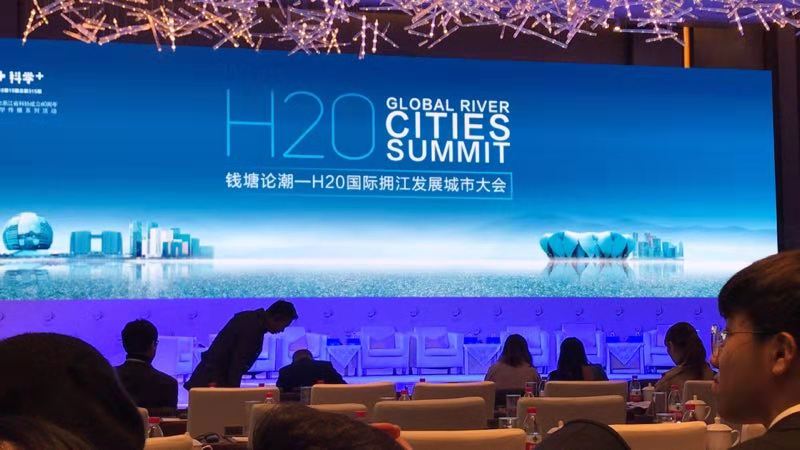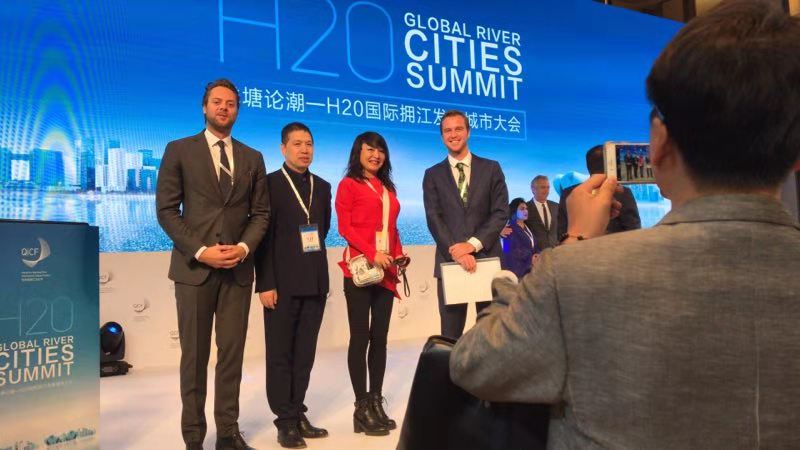The “2018 Global River Cities Summit” (H20) was successfully held in Hangzhou City, Zhejiang Province from November 14th to 15th. As the support unit of this Summit, the Secretary General of CBCGDF, Dr. Zhou Jinfeng focused on the perspective of urban biodiversity and sustainable development to demonstrated for all the participants.
The H20 Summit is a high-profile global river cities event, which invites representatives from more than 20 countries around the world. Focusing on the core concept of “organic development of cities and rivers”, discussed on how future urban development should strengthen ecological governance and to achieve sustainable development and other issues, and ultimately achieve a harmonious coexistence between man and nature. Dr. Zhou was invited by the head of the H20 Hangzhou initiators to give a keynote speech entitled “Green Development and Urban Civilization” in the forum.
The first is to protect biodiversity. Traditionally, it is widely believed that the protection of biodiversity is the protection of conservation areas. The protection of natural habitats is of utmost importance, but we must know that as cities continue to expand, urban biodiversity conservation is paramount.
There are three reasons. The first reason is that the city has the largest population. This means that the protection of biodiversity in the city is the most important for its publicity and education. We must make clear that the fundamental of biodiversity conservation is to change people's perceptions. Based on this, urban biodiversity conservation is crucial. The second reason is that because the city is closest to people, its biodiversity conservation can bring the most direct benefits to mankind. The third reason is that many cases show that cities are currently the most serious source of damage to biodiversity. For example, insect biodiversity in German protected areas has fallen by as much as 70% over the past 20 years. The main reason for this is not the increase in human activities in the forest, but the fact that human activities outside the forest, in cities, in villages, and in densely populated areas of humans have an impact on the biodiversity of protected areas. Similarly, in the Antarctic area, chemical stuff has been found in penguins’ bodies. The chemical thing was not from the Antarctic but from industrial production in densely populated areas. In view of this, biodiversity conservation in the most densely populated areas is not only beneficial to the protection of conservation areas, but also to the protection of the global ecology.
However, the current protection (work) of urban biodiversity is still far from enough, and people need to pay attention. Take the example of the salamander from Mexico City. Due to the domestic water consumption and emissions in the urban area of Mexico, the Xochimilco Lake District has dried up in large quantities and the water quality has declined. The number of Mexican salamander is decreasing. At the same time, they are also popular in aquariums, and the BBQ salamander is a popular dish on the Mexican table, which further exacerbates the decline in the number of salamanders. Now, the Mexican salamander has been classified as a serious endangered species. However, as we all know, Mexican salamander has a very important significance for the development of human science.
As a major enabler of biodiversity conservation and sustainable development, CBCGDF has carried out a series of work related to biodiversity conservation in several cities in recent years. In 2014, in order to save the rare and endangered plant species Acer pentaphyllum, to protect the biodiversity of southwestern China. CBCGDF establishes a special working group for rescuing Acer pentaphyllum, and simultaneously launches a special fundraising campaign for the protection of the plant species. The funds are all used for the protection and publicity of the species populations, the research of related topics and the protection of its living environment.
At the preparatory meeting of the H20 Summit, Dr. Zhou further emphasized that in addition to urban biodiversity conservation, the green development of the city cannot be ignored. Modern cities are not green in many behaviors. For example, urban grassland, plastic flowers, large demand for redwood, pesticide spraying, waste of resources, excessive lighting, air pollution, etc., many behaviors in the city have to be “green” because the green development of the city is closely related to people’s lives. For example, Dr. Zhou pointed out, the newly-increased take-out business, the using of plastic bottles in daily meetings in many cities, have caused a large number of forests to disappear. Even if we build a human wall at the edge of the forest to stop it, the forest will still disappear because the market is too powerful. Therefore, we should go to the source of the city to promote and educate and advocate people to reduce the demand for plastic consuming, which can fundamentally prevent the disappearance of forests.
"The green development of the city cannot be reversed," Dr. Zhou said. "It is true that we can go to the seaside to 'pick up plastic waste", but 'reducing plastics' is the foundation of the greening sea coast. If there was no effort from the source, what we have been advocating, in terms of green development, is almost impossible to achieve."
One of the core concepts of this H20 Summit is “the real development of the Yangtze River”. In response to this concept, Dr. Zhou believes that many riverside cities are now facing difficulties in river management. For example, is the anti-seepage treatment of Beijing Yuanmingyuan necessary? Does anti-seepage treatment have adverse effects on ecology and nature? These are all questions that everyone needs to think about. We advocate the city's biodiversity conservation and green development, but in fact we are redefining the “beauty of the new era”. In fact, in the hardening of the embankment and the layout of the roads around the river, as long as the safety can be ensured, we can reduce the hardening of the embankment, because whether it is water leakage or the drying of the lake, they are a natural phenomenon, they are themselves, it is a kind of beauty. We need to leave a space for nature and give the river to nature. We should learn to share with nature, not excessively invade nature.
Dr. Zhou emphasized that in the urban construction, the "beauty of the new era" should be changed, and it should conform to the ecological civilization. What is ecological civilization? It is a kind of culture, a way of life, a kind of fashion, a kind of change, and a brand-new connotation of the times. The beauty of the era of ecological civilization is more natural. We must advocate ecological civilization and adhere to green development, we must fundamentally change our cognitive mistakes.
“We are a spokesperson of ‘green’. If our speech can prompt domestic and foreign city managers to think and be able to inspire and change the future urban development planning, then our work is worthy”, Dr Zhou said at the H20 Summit preparatory meeting. He hopes that the staff of CBCGDF will give more ideas and suggestions, more brainstorm ideas, and work together with other parties to do a good job in the H20 Global River Cities Summit.


(Photo: CBCGDF)
Original Chinese article:
http://www.cbcgdf.org/NewsShow/4854/6755.html
By / Niu Jingmei
